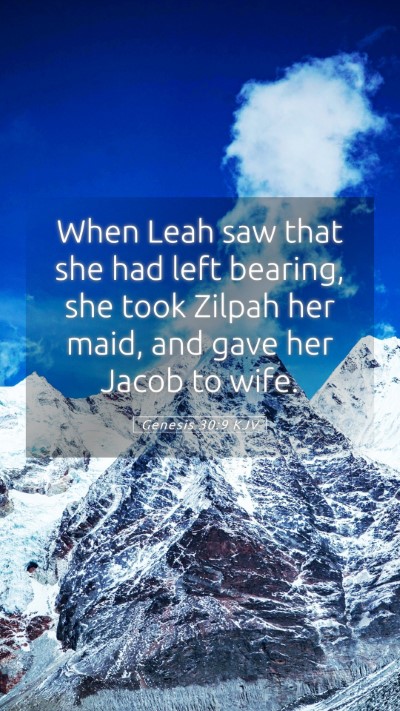Understanding Genesis 30:9
Genesis 30:9 states: "When Leah saw that she had stopped bearing children, she took her maid Zilpah and gave her to Jacob as a wife." This verse is pivotal in understanding the dynamics of Jacob's family and the cultural norms of the time.
Bible Verse Meanings and Interpretations
This verse provides insight into the struggles of Leah, who, feeling inadequate due to her lack of children, resorts to using her maid as a surrogate to bear children for Jacob. This action reflects not only her desperation but also the cultural practices of that period regarding family and childbearing.
Commentary Insights
-
Matthew Henry’s Commentary:
Henry notes that Leah's actions stemmed from her desire to be loved and valued. Her initiative to provide a child through Zilpah indicates her profound emotional turmoil and her belief that childbearing was key to marital success.
-
Albert Barnes’ Commentary:
Barnes emphasizes the significance of Zilpah being offered to Jacob, reflecting the social customs of the day where women could bear children on behalf of their infertile counterparts. This act highlights the competition between Leah and Rachel for Jacob’s affection.
-
Adam Clarke’s Commentary:
Clarke explains the implications of Leah’s action, connecting it to the subsequent births of Zilpah’s children to Jacob, further complicating family relationships. He notes the societal acceptance of such arrangements in ancient Hebrew culture.
Bible Study Insights
The context of Genesis 30:9 can be layered with various themes, such as social structure, familial relationships, and cultural expectations within ancient Israelite society. Understanding these factors enhances our comprehension of the text.
Historical Context
In the historical setting, women were often judged by their ability to bear children. Leah’s actions illustrate the societal pressures faced by women and the lengths they would go to fulfill their role.
Cultural Reflection
The practice of using a servant as a surrogate echoes similar traditions in various cultures, illustrating the intersection of personal need and prevailing social customs. This brings to light the ongoing struggle for recognition and love within familial structures.
Applying Genesis 30:9 to Daily Life
Modern readers can find applications in their own lives regarding the themes of worth, desperation for love, and the lengths to which individuals might go to feel valued and accepted. The scripture encourages reflection on the motivations behind personal choices.
Related Bible Cross References
- Genesis 29:31: Discusses Leah's initial reactions to being neglected due to Rachel’s beauty.
- Genesis 30:1: Rachel’s jealousy over Leah’s children leads to significant family tension.
- Genesis 16:1-4: This passage recounts Sarai giving her maid Hagar to Abraham, which parallels Leah’s actions with Zilpah.
Conclusion
Genesis 30:9 serves as a touching representation of human emotion and interaction within a biblical context. The combined insights from various commentaries enrich our understanding, making it clear that the significance of this scripture extends beyond its narrative. Engaging with biblical texts through thorough commentary and study deepens one’s faith journey and understanding of God’s word.


